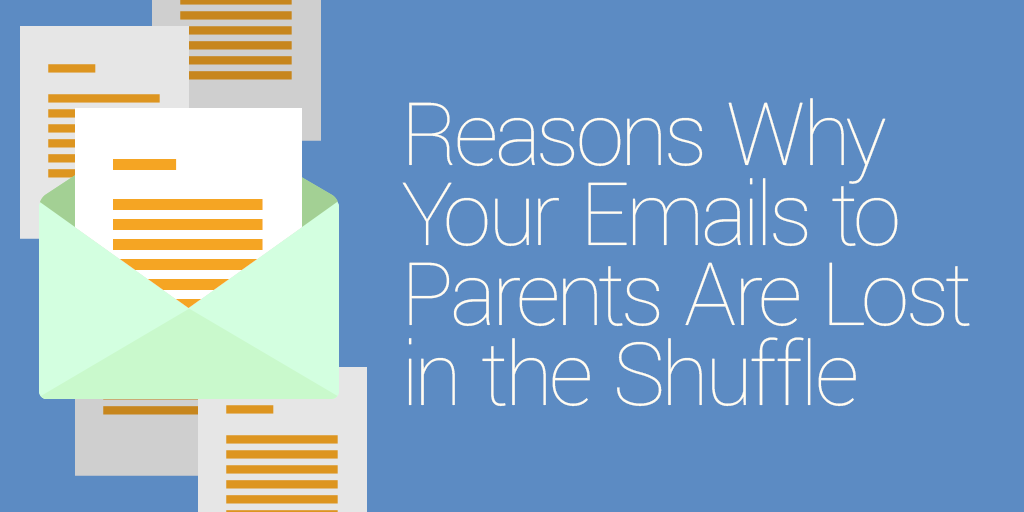One of the most frustrating comments to hear from parents is: “I had no idea about this event/deadline. I didn’t get the message. Did you send me an email?”
Of course, the exact language may vary, but you get the idea.
Communication breakdowns between schools and parents are all too common. Between busy schedules and the fact that most parents are multitasking five other chores as they read their emails, it’s easy for important messages to get lost in the shuffle.
Now, we talked about how to effectively communicate with parents in this article, so we won’t rehash the basics here.
Essentially, if you’re targeting your message, crafting the perfect subject line (i.e. a balance between being specific without giving away the house), and using a personalized greeting, you should see parents start to engage with your emails more.
If you’re taking all of these steps and you’re still not seeing the response you’d like from parents, today’s article should help.
We’ll be going over some of the most common reasons why your messages to parents are getting lost in the shuffle. We’ll even discuss how to fix each mistake so you don’t waste any more time.
[content_upgrade cu_id=”3303″]Bonus: As a special bonus, check out these extra tips to keep your emails interesting.[content_upgrade_button]Click Here[/content_upgrade_button][/content_upgrade]
Reason #1: Parents are Distracted
Have you ever tried having a conversation with a distracted parent? As much as they attempt to maintain eye contact with you, they’re inadvertently pulled in other directions as their child yells for them or starts running with scissors.
Well, this situation is probably much worse when your parent and student are not in front of you.
Parents are constantly being distracted and pulled in a dozen different directions.
So what does this have to do with your emails?
Chances are, your parents are reading your emails while also doing a zillion other things (you know, the whole multitasking thing, right?).

This means they’re likely to be interrupted. And when this happens, they may never get a chance to finish that message of yours.
Action tip: Now, since you can’t take away the inevitable distractions, you’ll have to tackle this situation a different way: by scheduling reminder emails any time you need parents to take action.
If you sent them an email about permission forms being due on Monday, you could set up an auto reminder that sends an email out on Thursday to let them know about the approaching deadline.
To make these messages really stand out for parents, use this [Reminder] tag before your subject line and they’ll know this email is especially important and time-sensitive.
Reason #2: You’re Sending Your Emails at the Wrong Time
If you think your mornings are crazy, imagine what it’s like for your parents.
And it doesn’t get easier from there; as the after work, before dinner time period can be even more hectic as parents have to organize a healthy meal, plan for bath time, and fit in homework.
You may not think this has anything to do with your messages getting lost, but it certainly does.
If you’re sending emails to parents during a busy chunk of time, they’re bound to get lost in the shuffle.

For starters, your parents may open them while being distracted, as we mentioned in the first point. Or, they could go unread entirely, which poses a serious problem if the information in the email is time sensitive.
The point is, you have to send your emails at just the right time or you’ll risk parents not receiving or opening the message.
Action tip: This may take some trial and error, but using the data (or analytics) from your email provider, you’ve got to figure out the best time to send emails to your parents.
Take note of which days show the highest open rates. Then, check to see if the timing makes a difference.
You may find that Wednesday during lunch time is the sweet spot for parents, since the craziness of the week is dying down and they have a chance to catch up during their breaks.
Generally speaking, you should avoid the beginning of the week since it’s so busy (i.e. Monday and Tuesday). You should also steer clear of the very end of the week (i.e. Friday) since parents may be checked out by then.
That leaves Wednesday and Thursday as good starting points.
Now that you’ve got that narrowed down, it’s all about figuring out which times work best. You may find that early morning emails perform better than your afternoon ones. Find what works for your school and keep sending them consistently (more on this next).
Reason #3: You Don’t Send Your Emails Consistently
Look, I get it. You’re busy. And sending out that newsletter at the same time every week may seem like a challenge.
But the truth is, your parents crave this routine. It makes their job easier because they know what to expect from your school.
That’s why it’s important that your messages are sent out at the same time and day each week.
The good news is that this tip is a cinch to tackle.
Action tip: Using that same scheduling feature from your email provider, you can create your emails and set the exact date and time (in the future) for them to launch.
This means you can still write your emails when it’s convenient for you and deliver them on time (and at the same time) each and every week.
Once your parents learn to expect that weekly update at the same time each week, they’ll be more likely to open it.
Reason #4: Your Last Email Was Too Long
Because parents are so distracted and short on time, it’s essential that you keep your emails as to-the-point as possible. This means you may not need to mention every little detail via email.
If parents find your weekly updates are taking too long to read, they’ll be less inclined to open (or read) them even if they’re sent out consistently.
Action tip: To hold your parents’ attention, we recommend keeping your emails under 800 words. Anything more and your parents may not have the time, energy, or focus to sift through it all.
It’s also a good idea to break up the content using subheadings and short paragraphs. We talked about those tips, plus a few more, in this article. Check that out before sending your next email announcement and see if you notice a difference.
Now that you understand what’s preventing your emails from being read, it’s time to take action.
Use the scheduling feature to send timely reminders to parents to keep them on top of important notices. You can also take advantage of this feature to send your messages consistently at the right time and the right day every week.
Don’t forget to keep your messages succinct by capping them at under 800 words, that way parents can actually have the time and energy to finish them.
Once you tackle these issues, you should have no problems getting your messages to parents.
[content_upgrade cu_id=”3303″]Bonus: Don’t forget to check out these additional tips for keeping your parent emails engaging.[content_upgrade_button]Click Here[/content_upgrade_button][/content_upgrade]

